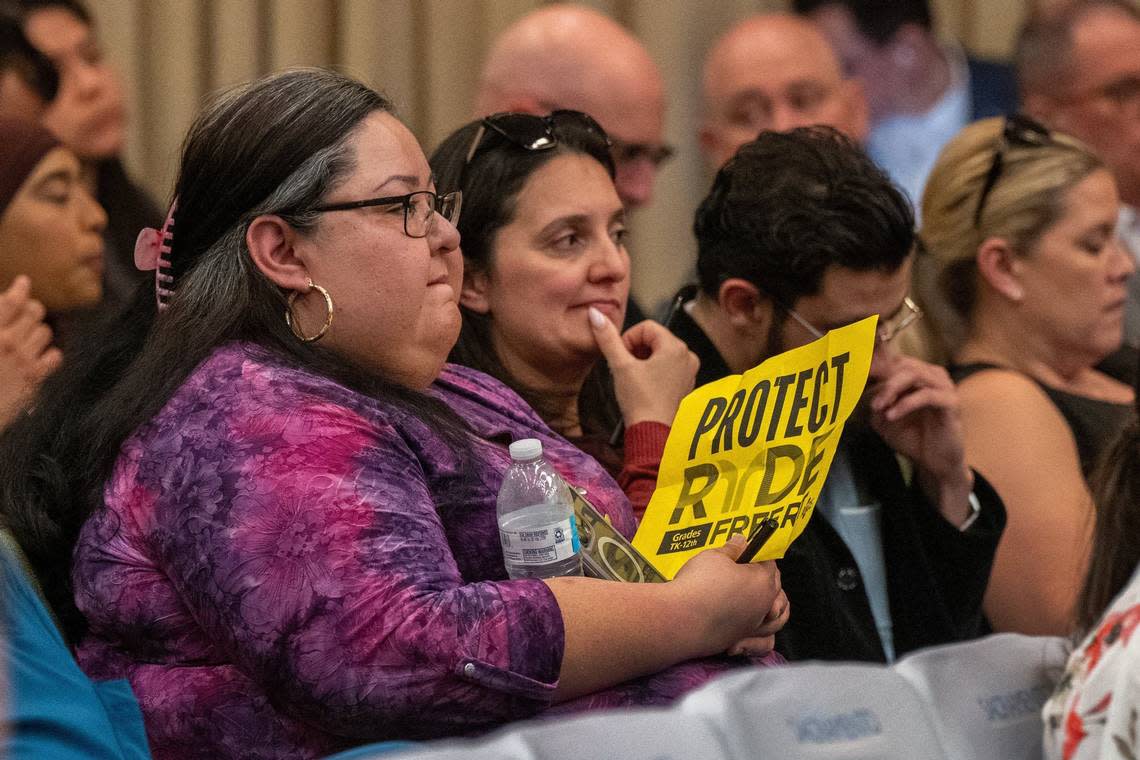Sacramento Mayor Darrell Steinberg wants to keep program that lets kids ride transit for free

- Oops!Something went wrong.Please try again later.
The Sacramento City Council Tuesday took a step toward keeping a popular program that allows kids to ride public transit for free.
City Manager Howard Chan had proposed cutting the program in light of a looming $66 million budget deficit, saving the city $1 million.
Mayor Darrell Steinberg suggested keeping it — one of several changes he wants to make to the budget by not putting an additional $3.8 million in a reserve fund, which Chan had proposed.
“We cannot lose this program,” Steinberg said during Tuesday’s council meeting. “This cannot and will not go away for our kids.”
Steinberg is trying to convince Sacramento Regional Transit’s board of directors to pay $250,000 and the school district boards to pay a combined $500,000. That would take the city’s share down to $250,000.
If the other agencies don’t commit to that by the planned council budget approval June 11, Councilwoman Katie Valenzuela said she wants the city to pay the full $1 million. It’s unclear whether the rest of the council would agree to that.
Former Councilman Jay Schenirer started the program in 2019, following the passage of the Measure U sales tax increase.
Before the meeting Tuesday, parents, students and teachers held a press conference outside City Hall to urge the council members to keep the program.
During Tuesday’s meeting, Steinberg also proposed the city keep the FUEL program, started by Councilman Eric Guerra, which provides legal aid for undocumented immigrants facing deportation. He also proposed the city keep charging $50 for certain parking tickets instead of raising them to $60, and to not increase administrative fees for certain sidewalk repair bills.
The sidewalk bills can already total over $20,000 for homeowners, a Sacramento Bee investigation found.
“When people have to pick up the cost of fixing their sidewalks ... raising the administrative fee, especially on lower-income people, can be a double whammy,” Steinberg said.
Steinberg also proposed the city allocate some funds to improve parks and the bike trail in the northern part of the city.
The council voted to direct staff to incorporate the mayor’s adjustments into the budget so they can have the full budget picture when they take the final vote on the budget June 11.
Police funding debated
Valenzuela, whose term will end in December, made one final pitch to her colleagues to decrease the police department’s role in responding to homeless calls.
She suggested the city increase the Department of Community Response’s funding so non-police employees could respond faster to non-violent homeless calls. Currently the department does not work 24/7, and the wait can be weeks after a home or business owner calls in to report a camp, Valenzuela said.
“We’re asking officers in an already high-vacancy department to absorb the full social cost of all the things happening that are contributing to crime,” Valenzuela said. “They’re pulling in all this overtime, they’re working double, triple shifts ... more and more often they’re asked to do things that are not their job.”
Ahead of Valenzuela’s comments, Dustin Smith of the city police officer union urged the council not to cut the department budget.
“We are the equivalent of a defunded police department,” Smith said. “We only have the resources to provide C-minus service at best. We cannot afford further cuts without further jeopardizing the safety of our community.”
In Chan’s proposed budget, the police department budget would grow from $222 million in the current fiscal year to an all-time-high of about $250 million. It has fewer officers than it did before the Great Recession, and often spends over $10 million in overtime.
Valenzueula said she has been asking city staff for over a year for a breakdown of how the overtime is spent, including whether it’s spent responding to calls.
During last year’s budget adoption, Valenzuela, Vang and Councilwoman Caity Maple all voted to redirect $6 million from the police budget toward the Department of Community Response. It did not have enough votes to pass.
The proposed budget does not lay off any employees and does not close homeless shelter beds. During next year’s budget the council will likely be faced with much tougher decisions, and a larger estimated $77 million deficit.
“We won’t have any extra fat left to cut,” Councilwoman Lisa Kaplan said.
